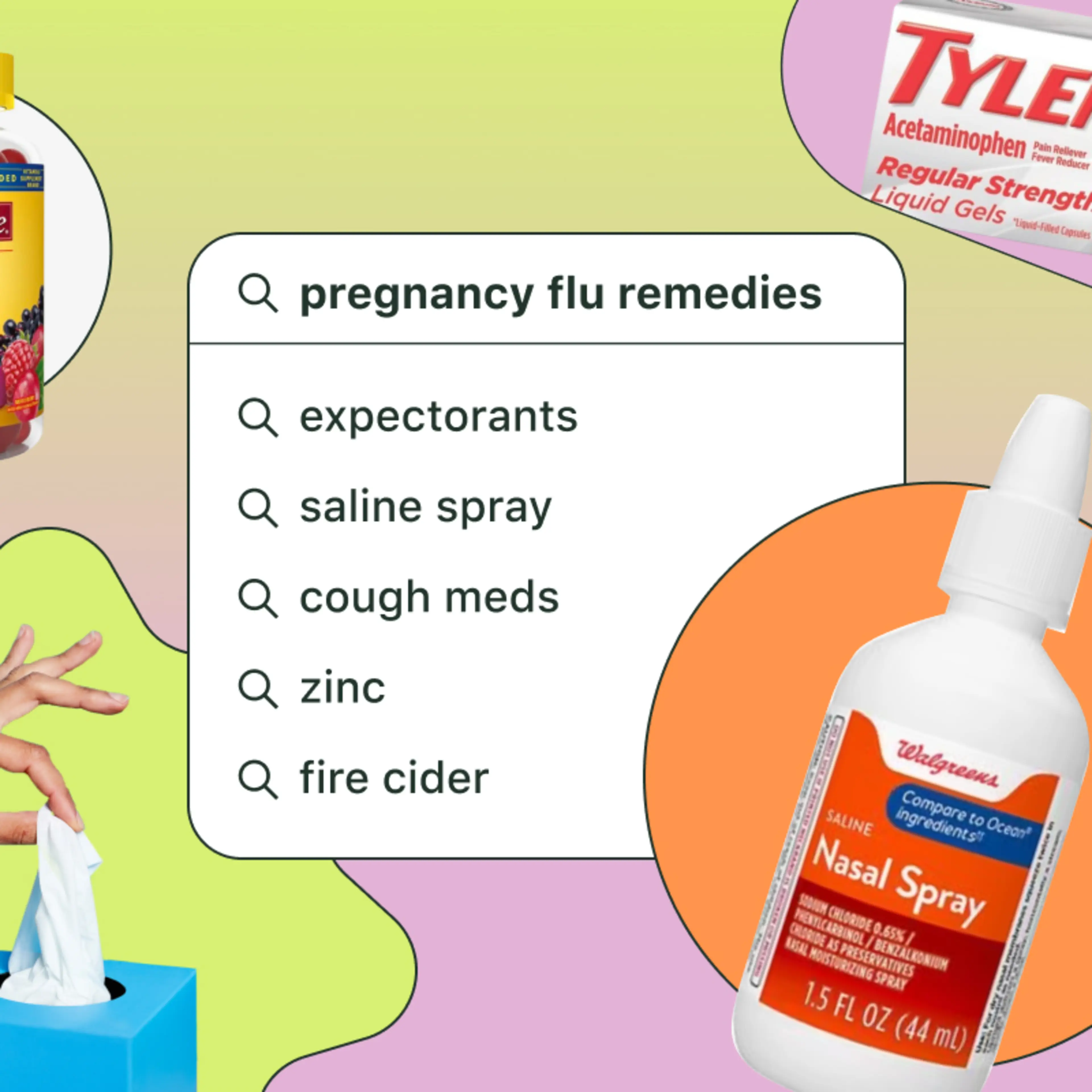-
Trying to Conceive
- Fertility Health
- Getting Pregnant
- Fertility Treatments
- Mental Health
- Pregnancy
-
Labor & Birth
- Getting Prepared
- Labor
- Postpartum
- Meditations
Get Expectful Emails
Support for fertility through baby’s first year
Subscribe for Free Subscribe
Subscribe
Trending Searches
- Pregnancy Symptoms
- Fertility Health
- Feeding
- Mental Health
- Meditations For Pregnancy
History
All Your Breastfeeding Cold + Flu Questions, Answered


Table of Contents
-
The Big Hitters: OTC Meds
-
How to Avoid Getting Sick in the First Place
When you imagined bonding with your baby while breastfeeding, you probably didn’t picture doing it while having a cough, fever, and chills. But this is an all-too-common scenario during winter cold and flu season.
The only thing harder than trying to adjust to a new baby and a new routine while postpartum is doing it while feeling absolutely miserable. We’re here to help answer all of your questions about what you can take—and what you might want to avoid—to relieve any nasty symptoms that come with the most unpleasant of holiday party favors: the cold and flu.
The Big Hitters: OTC Meds
Can you take cold medicine while breastfeeding?
When it comes to choosing a safe cold medicine for breastfeeding, the key is to keep it simple. Look for medicines that have a single ingredient that will treat your main symptom, and try to avoid decongestants if you can (they may affect milk production). Opt for things like Sudafed, Simply Saline or Flonase, Tylenol, and plain Mucinex.
Read more about cold medicine while breastfeeding
Can you take cough medicine while breastfeeding?
Yes—but the type you choose does matter because some decongestants can have a negative effect on your milk supply and your baby. The best option is to choose a cough medicine that has dextromethorphan and/or guaifenesin in it, so things like Mucinex DM and Robitusson Cough + Chest Congestion DM.
Read more about cough medicine while breastfeeding
Can you take Tamiflu and Theraflu while breastfeeding?
If your cold turns out to be the full-blown flu, you might need a little extra help. (Taking care of a newborn while dealing with chills and a fever is not an experience anyone dreams of having.) While both of these flu-targeting medications are safe to take while breastfeeding, opt for Tamiflu instead of Theraflu as the latter could affect your milk supply.
Read more about Tamiflu and Theraflu
Can you take Sudafed while breastfeeding?
Sudafed is a safe and easy option for symptom relief, but make sure to only take it for a short period of time to avoid any negative effects the decongestant could have on your milk supply.
Read more about Sudafed while breastfeeding
Can you take Mucinex while breastfeeding?
It all depends on which of Mucinex’s products you have your eye on. Remember: the simpler the better, so plain ol’ Mucinex is fine. Mucinex with a lot of ingredients like Mucinex D should be used with caution as it can affect your milk supply.
Read more about Mucinex and breastfeeding
Can you take cough drops while breastfeeding?
Yes, you can pop these glorious cough candies while breastfeeding with one caveat: if you’re making liberal use of them to soothe your throat and lungs, steer clear of cough drops that contain peppermint or menthol as they have the potential to decrease your milk supply.
Read more about breastfeeding and cough drops
Can you take DayQuil and NyQuil while breastfeeding?
While technically you can take both of these medications while breastfeeding, you should use caution and consult with a doctor before opting for these pills. The reason is they break the previously mentioned cold medicine rule to keep it simple. Both contain several ingredients, some of which could potentially cause trouble.
Read more about DayQuil and NyQuil
Can you take Excedrin while breastfeeding?
It’s best to steer clear of Excedrin while you’re breastfeeding as this medicine contains a couple ingredients that are generally not advised. The first, aspirin, is not recommended while pregnant or breastfeeding. The second ingredient of concern is caffeine. While you are allowed to have 2-3 cups of coffee a day while breastfeeding, getting additional caffeine via your cold medicine may put you over that limit.
Read more about Excedrin and breastfeeding
Can you take painkillers while breastfeeding?
If your winter bingo card includes a fever or a raging headache, find relief with Tylenol or ibuprofen. Both are safe to take during the postpartum period as long as you use them as directed. Aspirin, on the other hand, shouldn’t be your first choice as in rare instances it can have serious effects on your baby.
Read more about Tylenol, ibuprofen, and aspirin
Can you take Tums while breastfeeding?
Tums are a free-for-all while breastfeeding. If your stomach is causing you trouble feel free to reach for these multi-colored saviors.
Read more about Tums and breastfeeding
Can you have Pepto Bismol while breastfeeding?
Stick to the Tums if your stomach starts to feel a little dodgy as Pepto Bismol carries a rare risk of causing problems for your baby when it passes through breast milk.
Read more about Pepto Bismol and breastfeeding
How to Avoid Getting Sick in the First Place
Can you take Emergen-C while breastfeeding?
Feel free to reach for the Emergen-C when people in your social circle start going down with the cold or flu, but make sure not to exceed the recommended dosage as that can potentially cause unwelcome digestive troubles.
Read more about Emergen-C and breastfeeding
Can you have elderberry while breastfeeding?
A lot of people swear by elderberry as a natural way to stay healthy during the cold season. Unfortunately, more research is needed both to back up these claims as well as to determine this supplement’s effect on breastfeeding. For this reason, medical experts recommend not taking these tasty drops and gummies while breastfeeding.
Read more about elderberry and breastfeeding
Can you take vitamin C while breastfeeding?
Not only can you take vitamin C while you’re breastfeeding, you should take it, according to the National Institutes of Health. Keep in mind that if you eat a healthy, balanced diet that contains a lot of fruits and veggies, you will probably meet your daily needs through food. While there’s no harm in supplementing with a pill, higher doses of vitamin C are generally not absorbed by your body. So it won’t hurt, but it probably won’t help, either.
Read more about taking vitamin C while breastfeeding
Can you get a flu shot while breastfeeding?
The flu shot is safe for those who are breastfeeding and may even pass some immunity to your baby through milk. However, it’s important to consult with your doctor and weigh the pros and cons to make sure it’s right for you and your unique health situation.
Read more about getting the flu shot while breastfeeding

Want evidence-based health & wellness advice for fertility, pregnancy, and postpartum delivered to your inbox?

Expectful Team
Expectful Author
Expectful writers and editors are experts in health & wellness during fertility, pregnancy, and postpartum.
Related Articles
-

Can You Get a Flu Shot While Breastfeeding?
-

The Relationship Between Your Immune System and Pregnancy: It’s Complicated
-

Can You Take Emergen-C During Pregnancy?
Related Articles
-
 RELATED ARTICLE
RELATED ARTICLE
Can You Get a Flu Shot While Breastfeeding?
-
 RELATED ARTICLE
RELATED ARTICLE
Can You Take Emergen-C During Pregnancy?
-
 RELATED ARTICLE
RELATED ARTICLE
Your Definitive Guide to Pregnancy-Safe Cold & Flu Remedies

Table of Contents
Related Articles
-
 RELATED ARTICLE
RELATED ARTICLE
Can You Get a Flu Shot While Breastfeeding?
-
 RELATED ARTICLE
RELATED ARTICLE
The Relationship Between Your Immune System and Pregnancy: It’s Complicated
-
 RELATED ARTICLE
RELATED ARTICLE
Can You Take Emergen-C During Pregnancy?
Get the Newsletter
Evidence-based health and wellness resources for fertility, pregnancy and postpartum.
All Your Breastfeeding Cold + Flu Questions, Answered

When you imagined bonding with your baby while breastfeeding, you probably didn’t picture doing it while having a cough, fever, and chills. But this is an all-too-common scenario during winter cold and flu season.
The only thing harder than trying to adjust to a new baby and a new routine while postpartum is doing it while feeling absolutely miserable. We’re here to help answer all of your questions about what you can take—and what you might want to avoid—to relieve any nasty symptoms that come with the most unpleasant of holiday party favors: the cold and flu.
The Big Hitters: OTC Meds
Can you take cold medicine while breastfeeding?
When it comes to choosing a safe cold medicine for breastfeeding, the key is to keep it simple. Look for medicines that have a single ingredient that will treat your main symptom, and try to avoid decongestants if you can (they may affect milk production). Opt for things like Sudafed, Simply Saline or Flonase, Tylenol, and plain Mucinex.
Read more about cold medicine while breastfeeding
Can you take cough medicine while breastfeeding?
Yes—but the type you choose does matter because some decongestants can have a negative effect on your milk supply and your baby. The best option is to choose a cough medicine that has dextromethorphan and/or guaifenesin in it, so things like Mucinex DM and Robitusson Cough + Chest Congestion DM.
Read more about cough medicine while breastfeeding
Can you take Tamiflu and Theraflu while breastfeeding?
If your cold turns out to be the full-blown flu, you might need a little extra help. (Taking care of a newborn while dealing with chills and a fever is not an experience anyone dreams of having.) While both of these flu-targeting medications are safe to take while breastfeeding, opt for Tamiflu instead of Theraflu as the latter could affect your milk supply.
Read more about Tamiflu and Theraflu
Can you take Sudafed while breastfeeding?
Sudafed is a safe and easy option for symptom relief, but make sure to only take it for a short period of time to avoid any negative effects the decongestant could have on your milk supply.
Read more about Sudafed while breastfeeding
Can you take Mucinex while breastfeeding?
It all depends on which of Mucinex’s products you have your eye on. Remember: the simpler the better, so plain ol’ Mucinex is fine. Mucinex with a lot of ingredients like Mucinex D should be used with caution as it can affect your milk supply.
Read more about Mucinex and breastfeeding
Can you take cough drops while breastfeeding?
Yes, you can pop these glorious cough candies while breastfeeding with one caveat: if you’re making liberal use of them to soothe your throat and lungs, steer clear of cough drops that contain peppermint or menthol as they have the potential to decrease your milk supply.
Read more about breastfeeding and cough drops
Can you take DayQuil and NyQuil while breastfeeding?
While technically you can take both of these medications while breastfeeding, you should use caution and consult with a doctor before opting for these pills. The reason is they break the previously mentioned cold medicine rule to keep it simple. Both contain several ingredients, some of which could potentially cause trouble.
Read more about DayQuil and NyQuil
Can you take Excedrin while breastfeeding?
It’s best to steer clear of Excedrin while you’re breastfeeding as this medicine contains a couple ingredients that are generally not advised. The first, aspirin, is not recommended while pregnant or breastfeeding. The second ingredient of concern is caffeine. While you are allowed to have 2-3 cups of coffee a day while breastfeeding, getting additional caffeine via your cold medicine may put you over that limit.
Read more about Excedrin and breastfeeding
Can you take painkillers while breastfeeding?
If your winter bingo card includes a fever or a raging headache, find relief with Tylenol or ibuprofen. Both are safe to take during the postpartum period as long as you use them as directed. Aspirin, on the other hand, shouldn’t be your first choice as in rare instances it can have serious effects on your baby.
Read more about Tylenol, ibuprofen, and aspirin
Can you take Tums while breastfeeding?
Tums are a free-for-all while breastfeeding. If your stomach is causing you trouble feel free to reach for these multi-colored saviors.
Read more about Tums and breastfeeding
Can you have Pepto Bismol while breastfeeding?
Stick to the Tums if your stomach starts to feel a little dodgy as Pepto Bismol carries a rare risk of causing problems for your baby when it passes through breast milk.
Read more about Pepto Bismol and breastfeeding
How to Avoid Getting Sick in the First Place
Can you take Emergen-C while breastfeeding?
Feel free to reach for the Emergen-C when people in your social circle start going down with the cold or flu, but make sure not to exceed the recommended dosage as that can potentially cause unwelcome digestive troubles.
Read more about Emergen-C and breastfeeding
Can you have elderberry while breastfeeding?
A lot of people swear by elderberry as a natural way to stay healthy during the cold season. Unfortunately, more research is needed both to back up these claims as well as to determine this supplement’s effect on breastfeeding. For this reason, medical experts recommend not taking these tasty drops and gummies while breastfeeding.
Read more about elderberry and breastfeeding
Can you take vitamin C while breastfeeding?
Not only can you take vitamin C while you’re breastfeeding, you should take it, according to the National Institutes of Health. Keep in mind that if you eat a healthy, balanced diet that contains a lot of fruits and veggies, you will probably meet your daily needs through food. While there’s no harm in supplementing with a pill, higher doses of vitamin C are generally not absorbed by your body. So it won’t hurt, but it probably won’t help, either.
Read more about taking vitamin C while breastfeeding
Can you get a flu shot while breastfeeding?
The flu shot is safe for those who are breastfeeding and may even pass some immunity to your baby through milk. However, it’s important to consult with your doctor and weigh the pros and cons to make sure it’s right for you and your unique health situation.
Read more about getting the flu shot while breastfeeding

Want evidence-based health & wellness advice for fertility, pregnancy, and postpartum delivered to your inbox?

Expectful Team
Expectful Author
Expectful writers and editors are experts in health & wellness during fertility, pregnancy, and postpartum.
Related Articles
-

The Relationship Between Your Immune System and Pregnancy: It’s Complicated
-

Can You Take Emergen-C During Pregnancy?
Related Articles
-
 RELATED ARTICLE
RELATED ARTICLE
Can You Get a Flu Shot While Breastfeeding?
-
 RELATED ARTICLE
RELATED ARTICLE
Can You Take Emergen-C During Pregnancy?
-
 RELATED ARTICLE
RELATED ARTICLE
Your Definitive Guide to Pregnancy-Safe Cold & Flu Remedies
Your privacy is important to us. By subscribing you agree to our Privacy Policy and Terms & Conditions.
This site is protected by reCAPTCHA and the Google Privacy Policy and Terms of Service apply.
Connect With Us
Download Our App
Download Our App
© 2025 Babylist, Inc. All rights reserved.
